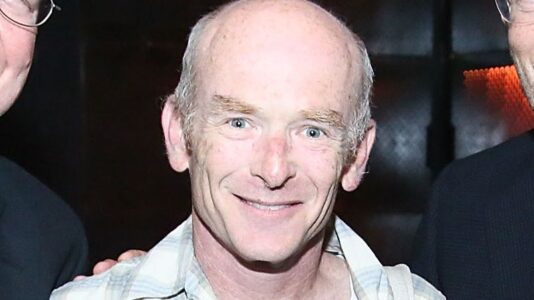Spotlight on Paddy Considine’s Gripping Performance in MobLand
MobLand, streaming on Paramount+, has recently caught the attention of audiences with its powerful storytelling and an impressive ensemble cast, featuring heavyweights like Pierce Brosnan, Helen Mirren, and Janet McTeer. However, it is Paddy Considine who has emerged with an extraordinary performance that could merit an Emmy nod. His portrayal of Kevin, the son of Brosnan’s character Conrad and Mirren’s Maeve, reaches new emotional heights in the latest episode titled "Beggars Banquet," particularly during a poignant confrontation with his abuser, played by Nigel Lindsay.
A Heart-Wrenching Confrontation
In a scene that has been building throughout the season, Kevin finally encounters Alan Rusby, the prison guard who assaulted him during his teenage years. Unlike typical portrayals in similar narratives, this moment is laden with tension. Rather than attack, Kevin faces an unexpected turn: Alan does not remember him and appears friendly, eliciting a deeply conflicted response from both Kevin and the audience.
Considine masterfully conveys Kevin’s turmoil. His minute facial expressions, from twitching lips to narrowed eyes, effectively communicate the intensity of the moment, contrasting with Alan’s seemingly benign demeanor. The audience sees a victim grappling with complex feelings of revenge and vulnerability, diverging from traditional male characters often depicted as purely aggressive.
Deep Psychological Layers
As Kevin confronts Alan, he is not just a hardened gangster; he is a man on the edge of emotional collapse. Considine portrays Kevin as conflicted, revealing the character’s frailty and inner struggles. When Kevin finally speaks of his trauma, the bitter and intense delivery of the word "rape" serves as a clarion call for recognition—not just from Alan, but for anyone who has faced similar horrors.
The setting itself—a domestic kitchen—juxtaposes the brutality of Kevin’s intentions with the stark normalcy of everyday life, heightening the scene’s impact. The narrative challenges viewers to empathize with Kevin rather than merely relish in the idea of revenge.
The Dynamics of Violence and Vulnerability
The episode keenly balances the themes of revenge and the profound implications of male sexual assault, showcasing Kevin’s emotional scars that go beyond physical violence. As the story unfolds, the emotional gravity of his actions draws viewers back to his tragic childhood, revealing a scared child rather than a psychopathic avenger.
When Kevin ultimately pulls the trigger, the act is depicted not as a cathartic victory, but as a resigned choice tainted by regret and despair. Considine’s cold, apathetic expression betrays the reality that this act will not grant Kevin peace; instead, it promises to deepen his existing trauma.
A Call for Recognition
As the season progresses toward its conclusion, viewers hope for further exploration of Kevin’s character arc and the impact of his choices on his relationships, particularly within his own family. The closing moments of this episode leave us questioning not just the path forward for Kevin, but also the overarching theme of trauma and its manifestations.
With such an intricate performance, MobLand not only showcases the craft of actors but also serves as a reminder of the emotional weight carried by victims of abuse. It is essential that award committees recognize performances like Considine’s, which illuminate complex societal issues while delving deep into human emotions. As audiences await the season finale on June 1, Considine’s portrayal remains a crucial conversation starter in both entertainment and discussions around mental health, making a significant mark in the television landscape.









